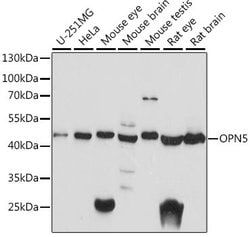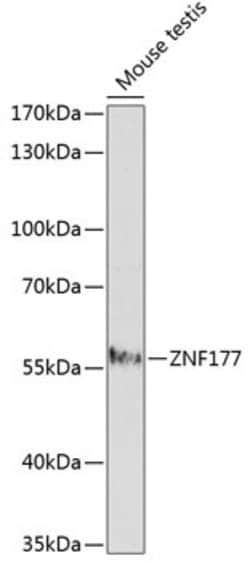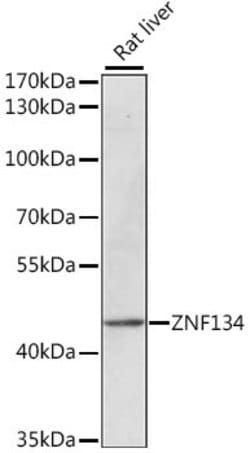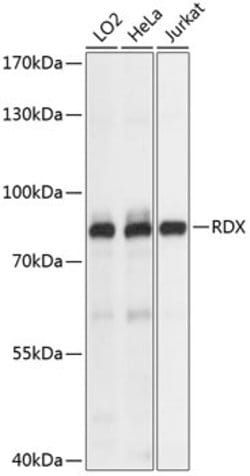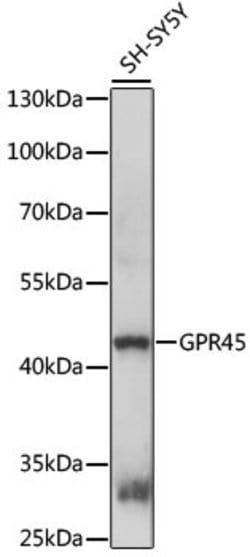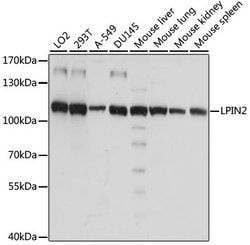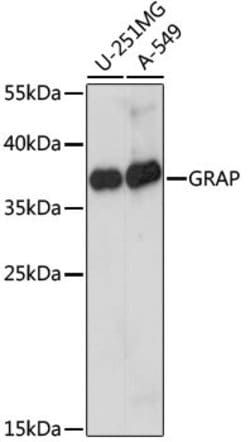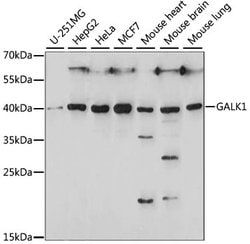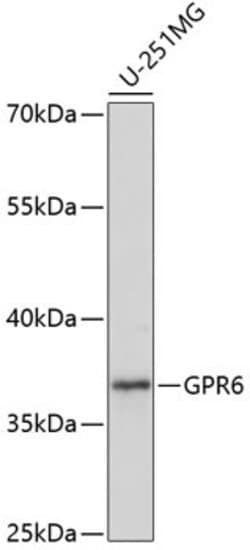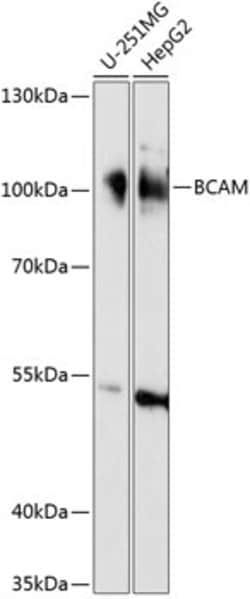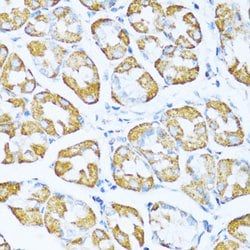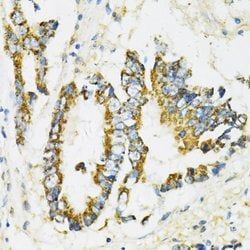PIPA590013
GPR6 Polyclonal Antibody, Invitrogen™
Manufacturer: Thermo Scientific
Select a Size
| Pack Size | SKU | Availability | Price |
|---|---|---|---|
| Each of 1 | PIPA590013-Each-of-1 | In Stock | ₹ 46,502.50 |
PIPA590013 - Each of 1
In Stock
Quantity
1
Base Price: ₹ 46,502.50
GST (18%): ₹ 8,370.45
Total Price: ₹ 54,872.95
Antigen
GPR6
Classification
Polyclonal
Conjugate
Unconjugated
Gene
GPR6
Gene Alias
AI852874, G protein-coupled receptor 6, Gm233, GPR6, G-protein coupled receptor 6, RCNL3, Sphingosine 1-phosphate receptor GPR6
Host Species
Rabbit
Purification Method
Affinity Chromatography
Regulatory Status
RUO
Gene ID (Entrez)
140741, 2830
Content And Storage
-20° C, Avoid Freeze/Thaw Cycles
Form
Liquid
Applications
Western Blot
Concentration
1.3 mg/mL
Formulation
PBS with 50% glycerol and 0.01% thimerosal, pH 7.3
Gene Accession No.
P46095, Q6YNI2
Gene Symbols
GPR6
Immunogen
Recombinant fusion protein containing a sequence corresponding to amino acids 253-362 of human GPR6 (NP_0052751)
Quantity
100 μL
Primary or Secondary
Primary
Target Species
Human, Mouse
Product Type
Antibody
Isotype
IgG
Description
- Immunogen sequence: WRHAHQIALQ QHCLAPPHLA ATRKGVGTLA VVLGTFGASW LPFAIYCVVG SHEDPAVYTY ATLLPATYNS MINPIIYAFR NQEIQRALWL LLCGCFQSKV PFRSRSPSEV; Positive Samples: U-251MG; Cellular Location: Cell membrane, Multi-pass membrane protein The G-protein-coupled receptor (GPCR) superfamily is comprised of an estimated 600-1,000 members and is the largest known class of molecular targets with proven therapeutic value
- GPR6 is an orphan, constitutively active G-coupled protein receptor, involved in a wide array of functions such as neurite growth, amyloid processing and appetitive learning
- GPR6 is predominantly expressed in neurons in the striatum of the brain
- GPR6 was found to be expressed on the cell surface and in intracellular compartments.
Compare Similar Items
Show Difference
Antigen: GPR6
Classification: Polyclonal
Conjugate: Unconjugated
Gene: GPR6
Gene Alias: AI852874, G protein-coupled receptor 6, Gm233, GPR6, G-protein coupled receptor 6, RCNL3, Sphingosine 1-phosphate receptor GPR6
Host Species: Rabbit
Purification Method: Affinity Chromatography
Regulatory Status: RUO
Gene ID (Entrez): 140741, 2830
Content And Storage: -20° C, Avoid Freeze/Thaw Cycles
Form: Liquid
Applications: Western Blot
Concentration: 1.3 mg/mL
Formulation: PBS with 50% glycerol and 0.01% thimerosal, pH 7.3
Gene Accession No.: P46095, Q6YNI2
Gene Symbols: GPR6
Immunogen: Recombinant fusion protein containing a sequence corresponding to amino acids 253-362 of human GPR6 (NP_0052751)
Quantity: 100 μL
Primary or Secondary: Primary
Target Species: Human, Mouse
Product Type: Antibody
Isotype: IgG
Antigen:
GPR6
Classification:
Polyclonal
Conjugate:
Unconjugated
Gene:
GPR6
Gene Alias:
AI852874, G protein-coupled receptor 6, Gm233, GPR6, G-protein coupled receptor 6, RCNL3, Sphingosine 1-phosphate receptor GPR6
Host Species:
Rabbit
Purification Method:
Affinity Chromatography
Regulatory Status:
RUO
Gene ID (Entrez):
140741, 2830
Content And Storage:
-20° C, Avoid Freeze/Thaw Cycles
Form:
Liquid
Applications:
Western Blot
Concentration:
1.3 mg/mL
Formulation:
PBS with 50% glycerol and 0.01% thimerosal, pH 7.3
Gene Accession No.:
P46095, Q6YNI2
Gene Symbols:
GPR6
Immunogen:
Recombinant fusion protein containing a sequence corresponding to amino acids 253-362 of human GPR6 (NP_0052751)
Quantity:
100 μL
Primary or Secondary:
Primary
Target Species:
Human, Mouse
Product Type:
Antibody
Isotype:
IgG
Antigen: BCAM
Classification: Polyclonal
Conjugate: Unconjugated
Gene: BCAM
Gene Alias: 1200005K12Rik, antigen identified by monoclonal antibody F8, AU, Auberger B antigen, basal cell adhesion molecule, basal cell adhesion molecule (Lu and Au blood groups), basal cell adhesion molecule (Lutheran blood group), basal cell adhesion molecule Lutheran blood group, BCAM, B-CAM, B-CAM cell surface glycoprotein, B-cell adhesion molecule, CD239, F8/G253 antigen, glycoprotein 95kDa, Gplu, LU, lutheran antigen, Lutheran blood group, Lutheran blood group (Auberger b antigen included), Lutheran blood group glycoprotein, Lutheran blood group variant LUGA, lutheran glycoprotein, MSK19
Host Species: Rabbit
Purification Method: Affinity Chromatography
Regulatory Status: RUO
Gene ID (Entrez): 4059
Content And Storage: -20° C, Avoid Freeze/Thaw Cycles
Form: Liquid
Applications: Western Blot
Concentration: 2.35 mg/mL
Formulation: PBS with 50% glycerol and 0.01% thimerosal, pH 7.3
Gene Accession No.: P50895
Gene Symbols: BCAM
Immunogen: Recombinant fusion protein containing a sequence corresponding to amino acids 352-547 of human CD239/CD239/BCAM (NP_0055722)
Quantity: 100 μL
Primary or Secondary: Primary
Target Species: Human
Product Type: Antibody
Isotype: IgG
Antigen:
BCAM
Classification:
Polyclonal
Conjugate:
Unconjugated
Gene:
BCAM
Gene Alias:
1200005K12Rik, antigen identified by monoclonal antibody F8, AU, Auberger B antigen, basal cell adhesion molecule, basal cell adhesion molecule (Lu and Au blood groups), basal cell adhesion molecule (Lutheran blood group), basal cell adhesion molecule Lutheran blood group, BCAM, B-CAM, B-CAM cell surface glycoprotein, B-cell adhesion molecule, CD239, F8/G253 antigen, glycoprotein 95kDa, Gplu, LU, lutheran antigen, Lutheran blood group, Lutheran blood group (Auberger b antigen included), Lutheran blood group glycoprotein, Lutheran blood group variant LUGA, lutheran glycoprotein, MSK19
Host Species:
Rabbit
Purification Method:
Affinity Chromatography
Regulatory Status:
RUO
Gene ID (Entrez):
4059
Content And Storage:
-20° C, Avoid Freeze/Thaw Cycles
Form:
Liquid
Applications:
Western Blot
Concentration:
2.35 mg/mL
Formulation:
PBS with 50% glycerol and 0.01% thimerosal, pH 7.3
Gene Accession No.:
P50895
Gene Symbols:
BCAM
Immunogen:
Recombinant fusion protein containing a sequence corresponding to amino acids 352-547 of human CD239/CD239/BCAM (NP_0055722)
Quantity:
100 μL
Primary or Secondary:
Primary
Target Species:
Human
Product Type:
Antibody
Isotype:
IgG
Antigen: NDUFA5
Classification: Polyclonal
Conjugate: Unconjugated
Gene: NDUFA5
Gene Alias: 2900002J19Rik, B13, CI-13kB, CI-13kD-B, complex I 13kDa subunit B, complex I subunit B13, Complex I-13kD-B, NADH dehydrogenase (ubiquinone) 1 alpha subcomplex 5, NADH dehydrogenase (ubiquinone) 1 alpha subcomplex, 5, NADH dehydrogenase (ubiquinone) 1 alpha subcomplex, 5, 13kDa, NADH dehydrogenase [ubiquinone] 1 alpha subcomplex subunit 5, NADH ubiquinone oxidoreductase subunit B13, NADH:ubiquinone oxidoreductase subunit A5, NADH-ubiquinone oxidoreductase 13 kDa-B subunit, NADHUO, NDUFA5, NUFM, type I dehydrogenase, ubiquinone reductase, UQOR13
Host Species: Rabbit
Purification Method: Affinity Chromatography
Regulatory Status: RUO
Gene ID (Entrez): 25488, 4698, 68202
Content And Storage: -20° C, Avoid Freeze/Thaw Cycles
Form: Liquid
Applications: Immunocytochemistry, Immunohistochemistry (Paraffin), Western Blot
Concentration: 1.42 mg/mL
Formulation: PBS with 50% glycerol and 0.02% sodium azide, pH 7.3
Gene Accession No.: Q16718, Q63362, Q9CPP6
Gene Symbols: NDUFA5
Immunogen: Recombinant fusion protein containing a sequence corresponding to amino acids 1-116 of human NDUFA5 (NP_0049911)
Quantity: 100 μL
Primary or Secondary: Primary
Target Species: Human, Mouse, Rat
Product Type: Antibody
Isotype: IgG
Antigen:
NDUFA5
Classification:
Polyclonal
Conjugate:
Unconjugated
Gene:
NDUFA5
Gene Alias:
2900002J19Rik, B13, CI-13kB, CI-13kD-B, complex I 13kDa subunit B, complex I subunit B13, Complex I-13kD-B, NADH dehydrogenase (ubiquinone) 1 alpha subcomplex 5, NADH dehydrogenase (ubiquinone) 1 alpha subcomplex, 5, NADH dehydrogenase (ubiquinone) 1 alpha subcomplex, 5, 13kDa, NADH dehydrogenase [ubiquinone] 1 alpha subcomplex subunit 5, NADH ubiquinone oxidoreductase subunit B13, NADH:ubiquinone oxidoreductase subunit A5, NADH-ubiquinone oxidoreductase 13 kDa-B subunit, NADHUO, NDUFA5, NUFM, type I dehydrogenase, ubiquinone reductase, UQOR13
Host Species:
Rabbit
Purification Method:
Affinity Chromatography
Regulatory Status:
RUO
Gene ID (Entrez):
25488, 4698, 68202
Content And Storage:
-20° C, Avoid Freeze/Thaw Cycles
Form:
Liquid
Applications:
Immunocytochemistry, Immunohistochemistry (Paraffin), Western Blot
Concentration:
1.42 mg/mL
Formulation:
PBS with 50% glycerol and 0.02% sodium azide, pH 7.3
Gene Accession No.:
Q16718, Q63362, Q9CPP6
Gene Symbols:
NDUFA5
Immunogen:
Recombinant fusion protein containing a sequence corresponding to amino acids 1-116 of human NDUFA5 (NP_0049911)
Quantity:
100 μL
Primary or Secondary:
Primary
Target Species:
Human, Mouse, Rat
Product Type:
Antibody
Isotype:
IgG
Antigen: PAI1
Classification: Polyclonal
Conjugate: Unconjugated
Gene: Serpine1
Gene Alias: Endothelial plasminogen activator inhibitor, nexin, plasminogen activator inhibitor type 1, PAI, PAI1, PAI-1, PAI1 protein, PAI1A, Pai1aa, Planh, Planh1, plas, plasminogen activator inhibitor, plasminogen activator inhibitor 1, plasminogen activator inhibitor I, plasminogen activator inhibitor, type I, plasminogen activator inhibitor-1, Plasminogen activator inhibitor-1 precursor (PAI-1) (Endothelial plasminogen activator inhibitor) (PAI), putative plasminogen activator inhibitor-1, RATPAI1A, serine (or cysteine) peptidase inhibitor, clade E, member 1, serine (or cysteine) proteinase inhibitor, clade E (nexin, plasminogen activator inhibitor type 1), member 1, serine (or cysteine) proteinase inhibitor, clade E, member 1, serine (or cysteine) proteinase inhibitor, member 1, serpin E1, serpin family E member 1, serpin peptidase inhibitor, clade E (nexin, plasminogen activator inhibitor type 1), member 1, SERPINE1, SERPINE-1
Host Species: Rabbit
Purification Method: Affinity Chromatography
Regulatory Status: RUO
Gene ID (Entrez): 5054
Content And Storage: -20° C, Avoid Freeze/Thaw Cycles
Form: Liquid
Applications: Immunocytochemistry, Immunohistochemistry
Concentration: 0.75 mg/mL
Formulation: PBS with 50% glycerol and 0.01% thimerosal, pH 7.3
Gene Accession No.: P05121
Gene Symbols: Serpine1
Immunogen: Recombinant fusion protein containing a sequence corresponding to amino acids 24-158 of human PAI-1/Serpin E1 (NP_0005931)
Quantity: 100 μL
Primary or Secondary: Primary
Target Species: Human
Product Type: Antibody
Isotype: IgG
Antigen:
PAI1
Classification:
Polyclonal
Conjugate:
Unconjugated
Gene:
Serpine1
Gene Alias:
Endothelial plasminogen activator inhibitor, nexin, plasminogen activator inhibitor type 1, PAI, PAI1, PAI-1, PAI1 protein, PAI1A, Pai1aa, Planh, Planh1, plas, plasminogen activator inhibitor, plasminogen activator inhibitor 1, plasminogen activator inhibitor I, plasminogen activator inhibitor, type I, plasminogen activator inhibitor-1, Plasminogen activator inhibitor-1 precursor (PAI-1) (Endothelial plasminogen activator inhibitor) (PAI), putative plasminogen activator inhibitor-1, RATPAI1A, serine (or cysteine) peptidase inhibitor, clade E, member 1, serine (or cysteine) proteinase inhibitor, clade E (nexin, plasminogen activator inhibitor type 1), member 1, serine (or cysteine) proteinase inhibitor, clade E, member 1, serine (or cysteine) proteinase inhibitor, member 1, serpin E1, serpin family E member 1, serpin peptidase inhibitor, clade E (nexin, plasminogen activator inhibitor type 1), member 1, SERPINE1, SERPINE-1
Host Species:
Rabbit
Purification Method:
Affinity Chromatography
Regulatory Status:
RUO
Gene ID (Entrez):
5054
Content And Storage:
-20° C, Avoid Freeze/Thaw Cycles
Form:
Liquid
Applications:
Immunocytochemistry, Immunohistochemistry
Concentration:
0.75 mg/mL
Formulation:
PBS with 50% glycerol and 0.01% thimerosal, pH 7.3
Gene Accession No.:
P05121
Gene Symbols:
Serpine1
Immunogen:
Recombinant fusion protein containing a sequence corresponding to amino acids 24-158 of human PAI-1/Serpin E1 (NP_0005931)
Quantity:
100 μL
Primary or Secondary:
Primary
Target Species:
Human
Product Type:
Antibody
Isotype:
IgG
